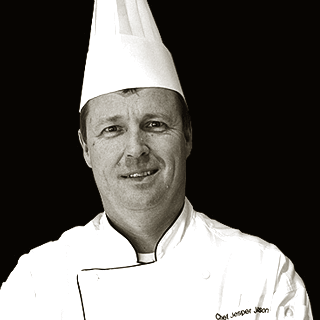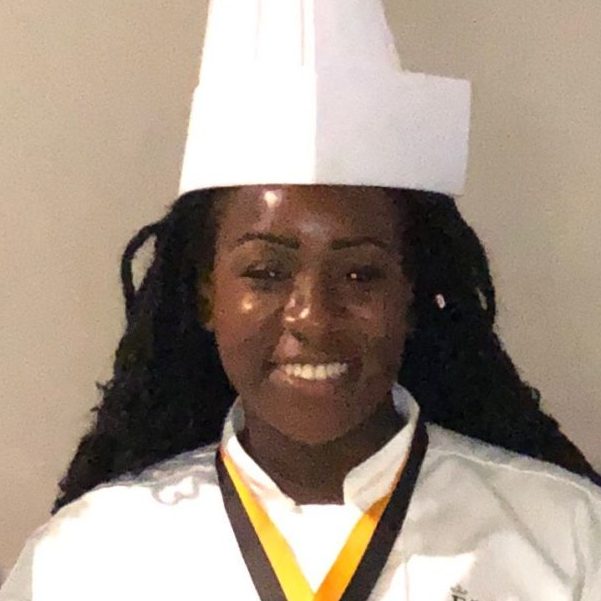Listen to This Article:
At first glance, a professional cook and a chef may seem similar. They both wear chef’s coats, work in a kitchen, and prepare food. But the day-to-day responsibilities of these two are vastly different. One is a skilled tradesperson, while the other leads and directs the kitchen staff and often creates a vision for the restaurant.
Each role calls for culinary expertise and good communication, but they each hold a distinct place within the brigade de cuisine, or kitchen hierarchy—with the executive chef or head chef placed squarely at the top.
Discover the important distinctions between these two kitchen roles and the skills necessary for success in each. Keep reading to explore the main differences between a professional cook and chef.
Cooks and Chefs Have Different Jobs in the Kitchen
The primary difference between a cook and a chef is their level of responsibility. A cook completes the tasks assigned to them in order to deliver a chef’s recipe. They should have the basic skills needed to execute the menu, including simple tasks like chopping or mixing, but they may also need more advanced technical skills for complex, multipart recipes.
On the other hand, a chef is a manager, the person who is ultimately responsible for the food that comes out of the kitchen. They often have more culinary education and experience in the kitchen, whether acquired via a formal culinary school or by working in the industry for many years (or both). There is no degree or certification that automatically advances a cook to become a chef. Instead, there’s a multi-faceted combination of education, experience, and leadership abilities.
Underneath the umbrella term of “cook” or “chef” are specialized roles—an executive chef is the leader of the kitchen and oversees the menu and overall direction of the restaurant’s culinary program, for example, while a pastry chef creates the desserts and may run a small team of pastry cooks. For cooks, a line cook has a different job than a prep cook.

A pastry chef is a specialized role within the kitchen.
What Is a Professional Cook’s Role?
Professional cooks are skilled technicians who prepare and make food. Most of their work is hands-on, transforming ingredients from their whole states into finished dishes.
There are many different types of cooks, each with varying responsibilities. A prep cook does preliminary work like peeling and chopping vegetables, pre-portioning cuts of protein, and concocting sauces or dressings. A line cook’s job description, on the other hand, includes cooking, plating, and completing dishes for service. In short, line cooks do the bulk of the cooking in a kitchen.
Professional cooks are also sometimes defined by their work stations. A fry cook runs the fryer for a steady supply of hot, fresh french fries and other crispy snacks. A grill cook is in charge of grilled items like burgers, chicken, steaks, and some vegetables. Line cooks are typically assigned to one station but need to be adaptable and ready to jump into another one.
Regardless of their specific role, cooks of all stripes need to have basic food safety knowledge and training, knife skills, an understanding of kitchen equipment, and an ability to carry out quality control.
While many cooks do have the goal of becoming a chef, or the “boss” of the kitchen, others prefer the life of the cook. A cook must perform to a high standard on each shift, but they are not responsible for the overall success of the kitchen or food service establishment. Some find that this means a lower stress level and better work-life balance. Plus, cooks get to do more hands-on professional cooking. If your culinary dreams involve cooking all day, every day, then a career as a cook may be right for you.
Definitions: Chef and Cook
Chef Definition
A chef is a manager who is ultimately responsible for the food that comes out of the kitchen. They may oversee and manage the entire kitchen operation, like an executive chef, or work within a section of the kitchen, like a pastry chef or sauce chef. They have managerial as well as culinary duties.
Cook Definition
A cook is an individual who prepares and cooks food within a professional kitchen setting. Cooks are essential to the daily operation of a kitchen and are responsible for executing the various stages of food preparation.
Professional Chef’s Role: What to Know
A professional chef is a trained, experienced culinarian who has worked in a professional kitchen setting and who usually occupies a more managerial role, either running a single-person department or leading a team of cooks. They should have culinary expertise and also be skilful problem-solvers under pressure—being able to assess situations and create solutions quickly is imperative.
A chef often spends a great deal of their time supervising and managing the rest of the crew rather than cooking. They must be able to jump into any position when needed and mentor other team members. But they may also get to create their own recipes and menus, influencing the restaurant’s reputation and helping shape its concepts. Therefore, while they have greater responsibility than cooks, they also receive more credit when a kitchen performs well.
Professional chefs usually start out as cooks and earn the title of chef later in their careers. There are more than 25 types of chefs within the brigade de cuisine. In addition to the aforementioned executive chef and pastry chef positions, other roles can include a chef de cuisine who manages the day-to-day operations, a sous chef who serves as the second in command, a pantry chef, sauce chef, and more.
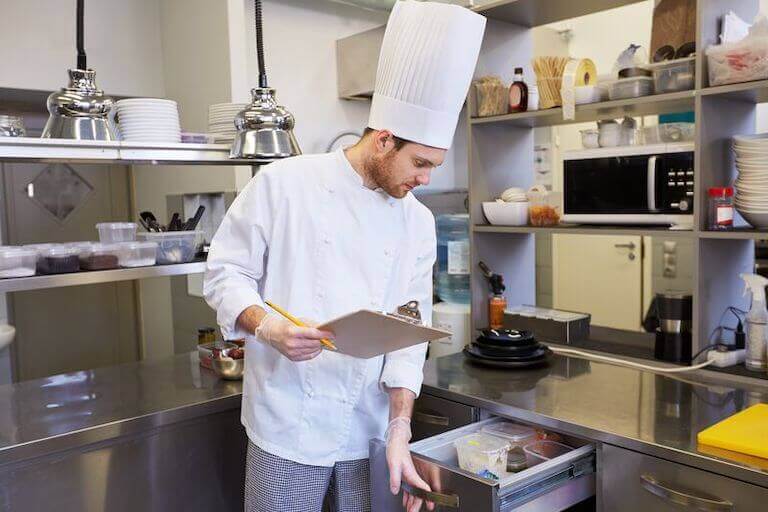
A professional chef needs culinary as well as managerial expertise.
*Information may not reflect every student’s experience. Results and outcomes may be based on several factors, such as geographical region or previous experience.
The Skills Professional Cooks Need
A professional cook’s skill level can vary quite a bit, from entry-level to the most expert cooks at high-end restaurants. Cooks should know basic cooking functions, like baking, roasting, steaming, broiling, and poaching, and when each is appropriate. They should also know the different kinds of cuts, so that when the chef asks them to chiffonade some basil or julienne a carrot, the cook will know what is being asked of them.
Professional cooks should know additional foundational skills, like how to make an emulsion, which knives to use for which tasks, and the basics of seasoning.
Additional skills can vary based on the cook’s position. A line cook must know how to identify “done-ness” in a cut of meat, for example. And a prep cook should be skilled at rapid chopping and pay close attention to labeling and dating their work.
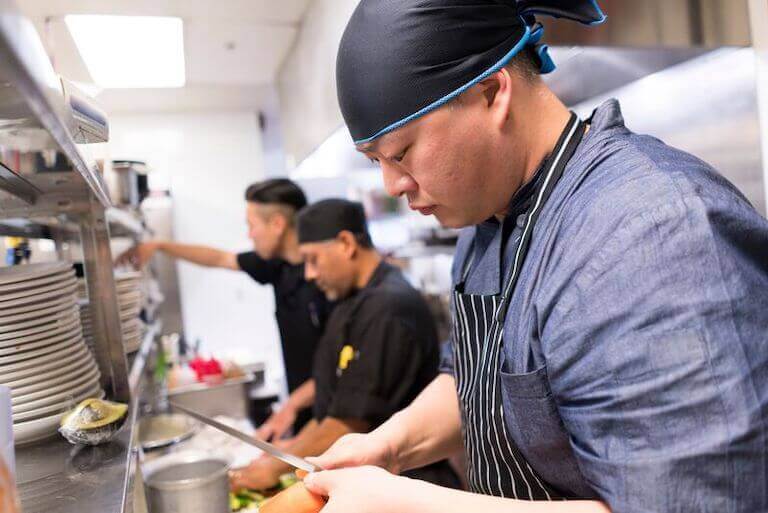
Line cooks do the bulk of the cooking in a professional kitchen.
When students attend culinary school at Auguste Escoffier School of Culinary Arts, they may graduate with many of these skills in their toolbox. During their hands-on industry externship, which is required in order to graduate, students can work in an operational kitchen where they can practice their skills in a commercial environment. With this type of preparation, they can become ready for their first professional job, where they can then continue to build on their skills and discover new techniques.
Skills Professional Chefs Need
Professional chefs must have extensive proficiency. They should have expertise in every skill that they expect their cooks to employ so that they can provide precise instruction and guidance. They may also be specialists in a single type of cuisine (like French or Japanese) or a certain cooking style (like barbecue or plant-based cooking).
The responsibilities of a chef go far beyond the food. They should also be skilled in menu planning, since they could be responsible for the final restaurant menu, from appetizers to desserts. They may also be required to create dishes that are both delicious and profitable, keeping labor and food costs in check. They need to be strong leaders, inspiring their employees and keeping them motivated to put out excellent food, day after day.
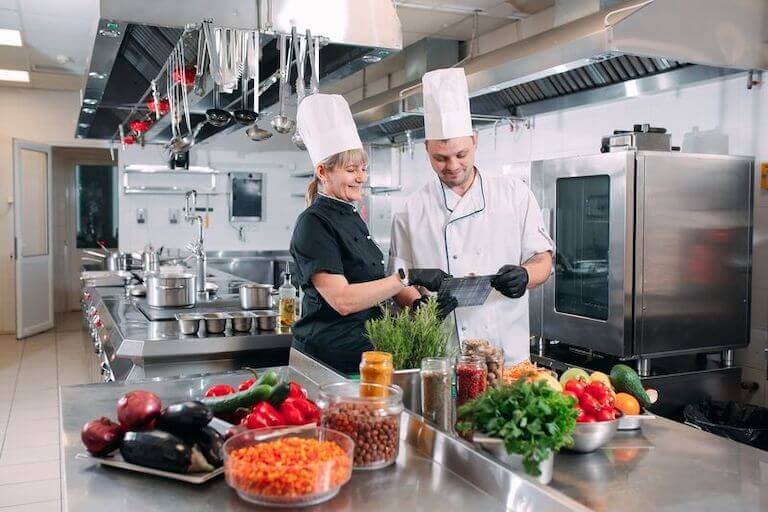
Chefs may be responsible for menu planning and inventory in addition to other jobs within a kitchen.
Some chefs are also independent business owners. For example, private chefs and personal chefs often run their own small businesses. Some chefs are also owners of restaurants and catering companies, so they must manage the business as well as the food.
It can take several years to earn the title of chef. Although culinary students do not graduate as chefs, a credential, like a degree or diploma, or a culinary certification from an industry association, can help demonstrate to future employers that the recipient obtained an advanced level of proficiency.
Whether Cook or Chef, Start Your Career with Culinary School
Whether your goal is to be the person who cooks the food each day or the chef who oversees a kitchen, culinary school can be a great place to start or advance your career.
At Auguste Escoffier School of Culinary Arts, associate degree students can begin their culinary education with cooking fundamentals and then move on to explore menus, leadership, communications, foodservice math and accounting, and entrepreneurship.
Contact our Admissions Department to explore more about degrees and diplomas from Escoffier and how they can help you achieve your goals.
TO DISCOVER MORE ABOUT A CAREER AS A CHEF OR COOK, TRY THESE ARTICLES NEXT:
- What It Takes to be an Executive Chef
- Executive Chef vs Head Chef: What Is the Difference?
- 13 Great Careers in the Food Industry
*Information may not reflect every student’s experience. Results and outcomes may be based on several factors, such as geographical region or previous experience.
**This article originally ran on Sept. 14, 2022, and has since been updated.

